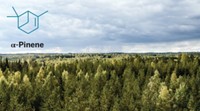Advertisement
Grab your lab coat. Let's get started
Welcome!
Welcome!
Create an account below to get 6 C&EN articles per month, receive newsletters and more - all free.
It seems this is your first time logging in online. Please enter the following information to continue.
As an ACS member you automatically get access to this site. All we need is few more details to create your reading experience.
Not you? Sign in with a different account.
Not you? Sign in with a different account.
ERROR 1
ERROR 1
ERROR 2
ERROR 2
ERROR 2
ERROR 2
ERROR 2
Password and Confirm password must match.
If you have an ACS member number, please enter it here so we can link this account to your membership. (optional)
ERROR 2
ACS values your privacy. By submitting your information, you are gaining access to C&EN and subscribing to our weekly newsletter. We use the information you provide to make your reading experience better, and we will never sell your data to third party members.
Environment
Isoprene Inhibits Cloud Formation
The C5 compound emitted by trees prevents formation of particulate aerosols caused by C10 monoterpenes, also emitted from plants
by Jyllian N. Kemsley
September 21, 2009
| A version of this story appeared in
Volume 87, Issue 38
Monoterpenes, C10H16, are volatile organic compounds emitted by plants and are key to the formation of cloud-seeding organic aerosols above the boreal forests of the northern regions of North America and Eurasia. Such forests also emit the C5 compound isoprene (2-methyl-1,3-butadiene), which researchers have now demonstrated inhibits the formation of particulate aerosols (Nature 2009, 461, 381). In plant chambers containing tree species typical of boreal forests, a research group led by Astrid Kiendler-Scharr, Thomas F. Mentel, and Jürgen Wildt of the Jülich Research Center, in Germany, studied the influence of isoprene concentration on aerosols. They found that isoprene’s inhibiting effect depends on hydroxyl radical concentration. The finding suggests that isoprene scavenges the radicals and prevents them from reacting with monoterpenes to seed aerosols. The results explain why aerosol formation above boreal forests is higher in the spring and fall than in the summer, when isoprene emissions are highest, the researchers say. And because plant species that emit isoprene are expected to flourish as global temperatures increase, the consequent reduction in cloud formation could lead to a feedback loop that encourages even higher temperatures.




Join the conversation
Contact the reporter
Submit a Letter to the Editor for publication
Engage with us on Twitter